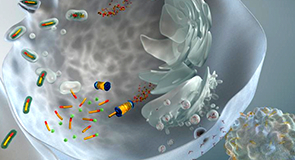ADXS-HER2
ADXS-HER2 Clinical Program for HER2-Expressing Solid Tumors
ADXS-HER2 is currently in development for the treatment of human epidermal growth factor receptor 2 (HER2)-overexpressing human cancers, including breast, gastric, and esophageal solid tumors and osteosarcoma. In May 2014, ADXS-HER2 was granted Orphan Drug Designation by the FDA for osteosarcoma. In January 2015, the FDA cleared Advaxis’ IND application to conduct a phase I clinical study of ADXS-HER2 (ADXS31-164) for the treatment of patients with metastatic HER2-expressing solid tumors. The clinical trial, which will be the first-in-human study of Advaxis' lead Lm Technology™ product for HER2-expressing cancers, is expected to begin patient enrollment in the summer of 2015 and will evaluate the safety and tolerability of ADXS-HER2 as a monotherapy in patients with metastatic HER2-expressing solid tumors such as breast, gastric, esophageal, and osteosarcoma. Results from the study will be used to determine the future clinical development program of ADXS-HER2.
ADXS-HER2 is an immunotherapy that is under investigation for targeting HER2-overexpressing cancers. The antigen in ADXS-HER2 is a combination antigen integrating two 2 external and 3 internal binding epitopes of the HER2 peptide into a truncated combination peptide fused to truncated LLO. By incorporating HER2 into the Advaxis live, attenuated vector, Advaxis is studying the delivery of the HER2 antigen fused to the immunostimulant LLO, directly inside antigen-presenting cells that are believed to drive a cellular immune response to HER2-overexpressing cells. The Advaxis approach is being researched for the inhibition of Treg and MDSC cells specifically in the tumors that have been promoting immunologic tolerance of the cancer.
Canine Osteosarcoma
We are currently conducting a Phase 1 study in companion dogs at the University of Pennsylvania, under the direction of Dr. Nicola Mason, evaluating the safety and efficacy of ADXS-HER2 in the treatment of canine osteosarcoma. The primary endpoint of the study is to determine the maximum tolerated dose of ADXS-HER2. Secondary endpoints for the study are progression-free survival and overall survival.
The preliminary findings of the Phase 1 clinical trial in dogs with osteosarcoma suggest that ADXS-HER2 is safe and well tolerated at doses up to 3 x 109 CFU with no evidence of cardiac, hematological, or other systemic toxicities. The study determined that ADXS-HER2 is able to delay or prevent metastatic disease and significantly prolong overall survival in dogs with osteosarcoma that had minimal residual disease following standard of care (amputation and follow-up chemotherapy). Dr. Mason presented data at the 2014 American College of Veterinary Internal Medicine (ACVIM) Forum which showed that 80% of the dogs treated (n=15) were still alive and median survival had not yet been reached; median survival in control dogs (n=13) was 316 days. Immunological analyses are also being conducted in this study to further evaluate the immune response to ADXS-HER2.
Osteosarcoma is the most common primary bone tumor in dogs, accounting for roughly 85% of tumors on the canine skeleton. Approximately 8,000-10,000 dogs a year (predominately middle to older-aged dogs and larger breeds) are diagnosed with osteosarcoma in the United States. This cancer initially presents as lameness and oftentimes visible swelling on the leg. Current standard of care treatment is amputation immediately after diagnosis, followed by chemotherapy and sometimes radiation for palliative care.


